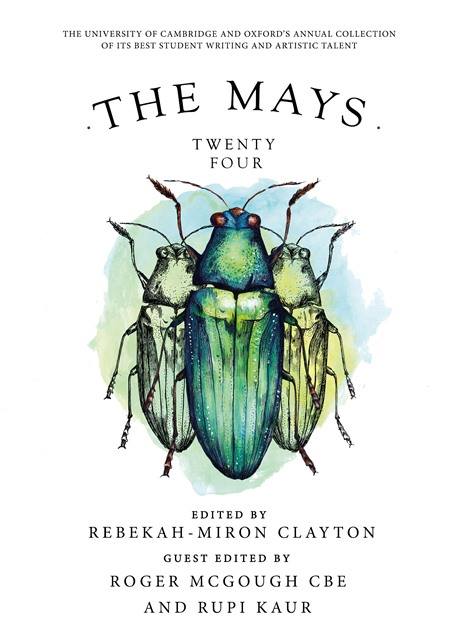Student writers put a heart-stopping amount of time, effort and talent into their work. Sometimes, if they’re lucky, they make it in to student anthologies. The Mays is far and away the most prestigious of these – for twenty-four years now they’ve been showcasing the best of Oxbridge’s creative output, and Issue 24 is no different. The anthology radiates the confidence and bravado of the best student writing. As an anthology, it’s deeply flawed – show me a student anthology that isn’t – but as a statement of intent, it’s damn powerful. As the cover hints, we’re witnessing the larval form of the great writers, poets and illustrators of tomorrow. Whatever its problems as a package, it’s worth it for the sheer potential which crackles through every page, and its best contributors have clearly long since started on the road to producing truly outstanding work .
The anthology opens with ‘Toothpaste, or, a Renaissance of Innocence’, by Isabella Luta, and there’s an appealing sense of being thrown in at the deep end. It’s a dense, rhythmic, often mesmerising stream of consciousness, capturing the post-adolescent angst of the clever and ever-so-slightly-pretentious humanities student; “I wish I could sit down in the middle of the street and look at all the houses and come up with more phrases like ‘emotionally semi-detached’.” It’s a bold and uncompromising opener, but as a story it suffers from the Dylan Thomas effect – lovely as the individual images are, the unrelenting force of them is exhausting. Other highlights include Jonathan Flieger’s ‘Facts and Histories’, which pulls some fascinating stylistic tricks with an unusual parallel paragraph layout, and Millie Brierley’s ‘Lady’, which mines astonishing pathos from the simple event of an old lady watching a nearly-destroyed VHS tape. The finest story on offer, though, is ‘Internal Logic’ by Jennifer M. Schaffer, about a creative writing teacher’s mental breakdown. It’s one of the most moving and clever things I’ve read this year, student writing or not.

While the prose offerings are strong, the poetry is more of a mixed bag. Some entries, particularly towards the end, are shockingly poor: undisciplined free verse, all-lowercase writing and the dreaded ‘untitled’ all crop up, all displaying the worst excesses of student poetry. On the positive side, Theophilus Kwek and Mary Anne Clark both turn in excellent work, Kwek with a sensitive exploration of death and taxis, and Clark with a haunting and atmospheric re-working of the Old English poem ‘Wulf and Eadwacer’, which makes intelligent use of the original’s repetitive, alliterative structure. Similarly good are Sarah Caulfield’s ‘Lost in Translatione’, a witty treatise on Latin, and Flora De Falbe’s ‘Haikus in November’, a wonderfully sparse and frosty little poem. Chlo Carson’s ‘Teabags’ is the standout of the crop, turning a banal household ritual into the stuff of genuinely wonderful poetry. The anthology also contains visual artworks, which display a consistent quality lacking in the poetry, with some particularly interesting examples of visual storytelling from Phoebe Thomson and Sophia Bharmal.
The anthology suffers from a weak structure and inconsistent presentation. The sequencing feels slipshod, with themes picked up and dropped over handfuls of entries, making things feel cluttered and disorganised. There are some odd formatting choices, as some entries get full title pages while others don’t and the occasional shift in font size is distracting. There’s also some sketchy copyediting (including missing paragraph asterisks and typos like “whattt else to say” and “tunelessly and timpatiently ”, neither of whose entries are experimental enough to suggest stylistic choice), as well as the frequent placing of line breaks in odd places. The presentation feels surprisingly subpar, given the glossy nature of the publication – I’ve read student zines more consistently presented than this. The ambitions of the editors are clear and admirable, but someone needed to sweat the small stuff.
The messiness of the presentation is annoying, but the messiness of the writing, at its best, is liberating. The flawed nature of the anthology does not detract from the talent on display: it enhances it. It’s a good rule of thumb that any artist who is unwilling to push the envelope is not worth bothering with. When I say the anthology is imperfect, I mean it as the highest compliment. Whatever is wrong with The Mays 24, its contributors are unafraid to fail. And it’s hard not to love them for that.
William Shaw
‘The Mays 24’ is available to buy from the magazine’s website.
We are on Twitter @Oxford_Culture, and on Facebook
An unwarranted level of negativity and shouts ill-informed. It would be a great shame if this student-writer impacted the sales and reputation of what is a small yet incredibly accomplished publication which deserves support.
I agree that this is an accomplished anthology – I enjoyed it very much, and I’m sorry if that did not come across in the review. I adore student writers (I may even be one myself some day), and I wish them (and the Mays) every success.
I agree that this is an accomplished anthology – I enjoyed it very much, and I’m sorry if that did not come across in the review. I adore student writers (I may even be one myself some day), and I wish them (and the Mays) every success.